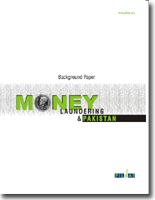This background paper has been specifically prepared by PILDAT in order to promote an informed discussion over the need for an effective and strong Anti-Money Laundering Legislation. This paper addresses some basic questions: the meaning of the term money laundering; its different stages; regional imperatives for Pakistan being surrounded by the Golden crescent and the Golden Triangle; and the adverse effects of hosting money launderers and terrorist financiers to the economy and national security, along with a fleet of other problems. The purpose of this document is to sensitise the stakeholders, of the damages incurred by sustaining an economy that is permissive of money laundering, as opposed to the benefits of having an efficient anti-money laundering legislation that is not only beneficial for the country but also fulfils our global obligation of collectively stifling money launderers’ networks to curtail illegitimate leakages in the global economy and subsequently, hold back transnational economic mafias from booming. To understand this mutualism, it is imperative to acknowledge the three stages of money laundering and how money launderers knit a transitional cobweb to blur the link between criminally earned money and the crime itself, in order to give it an appearance of having been earned through a different, legitimate, source altogether. It is in this context that PILDAT has planned a series of briefings on ‘Money Laundering and Pakistan’ for Parliamentarians, Media, Senior Government Officials and Businessmen. This Background Paper supplements two specially prepared publications: Briefing Paper on Anti-Money Laundering Legislation in Pakistan; and a Regional Comparative Study on Anti-Money Laundering Legislations, prepared by PILDAT for these briefings. This paper has been produced as an attempt to facilitate the stakeholders in founding a well discussed and thoughtfully structured AML Legislation for Pakistan by acknowledging the consequences of not complying with international standards and our obligations under FATF; and by ascertaining our role in tackling terrorist financing.







